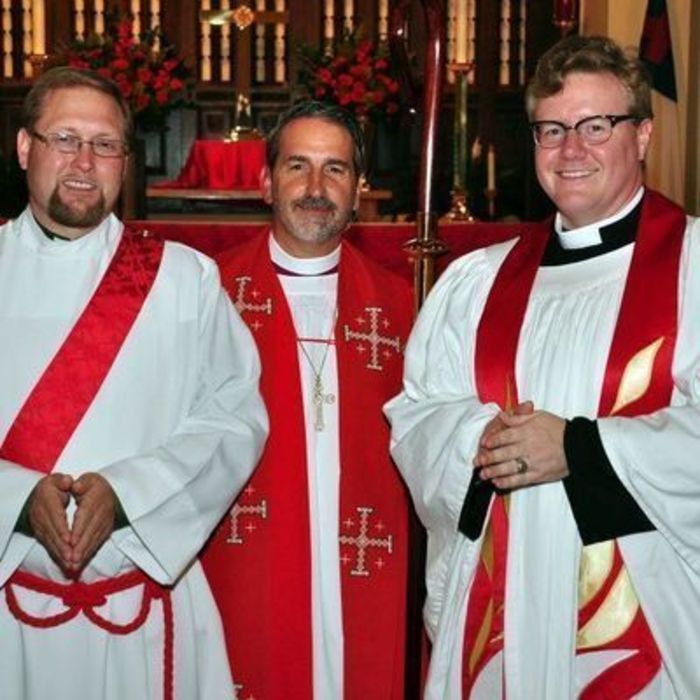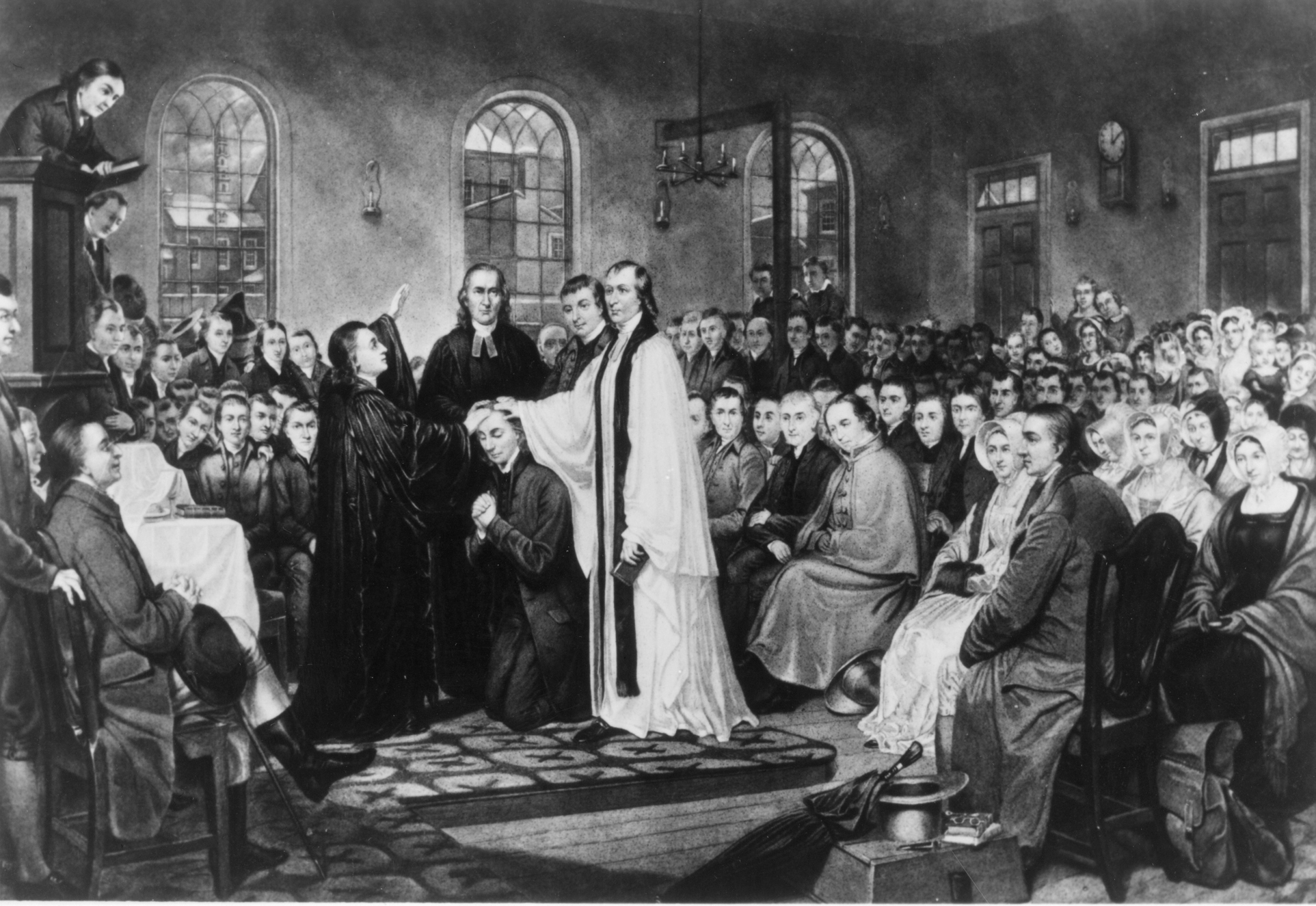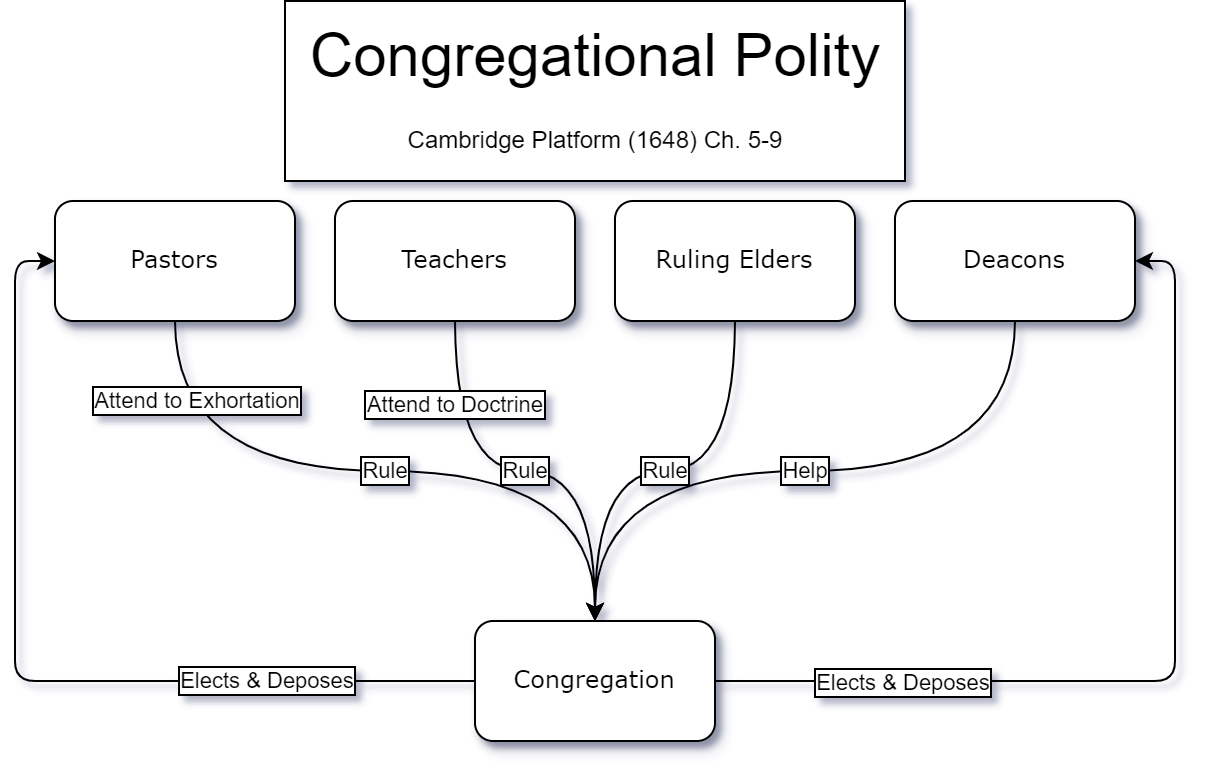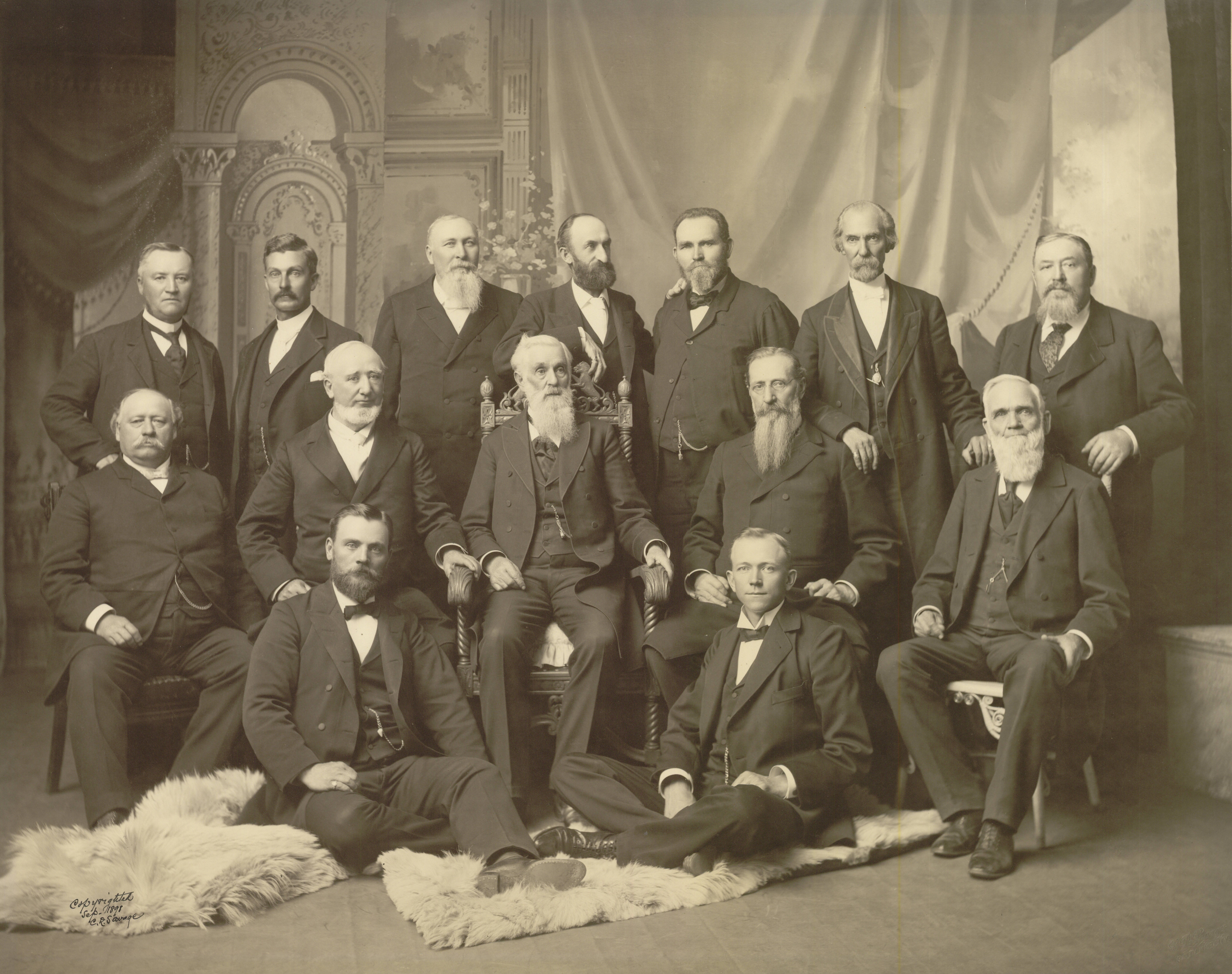Ecclesiastical polity on:
[Wikipedia]
[Google]
[Amazon]
 Ecclesiastical polity is the government of a church. There are local ( congregational) forms of organization as well as
Ecclesiastical polity is the government of a church. There are local ( congregational) forms of organization as well as
 Churches having episcopal polity are governed by bishops. The title bishop comes from the Greek word , which translates as ''overseer''. In the Catholic Church, bishops have authority over the diocese, which is both sacramental and political; as well as performing ordinations,
Churches having episcopal polity are governed by bishops. The title bishop comes from the Greek word , which translates as ''overseer''. In the Catholic Church, bishops have authority over the diocese, which is both sacramental and political; as well as performing ordinations,  Episcopal polity is the predominant pattern in Catholic, Eastern Orthodox,
Episcopal polity is the predominant pattern in Catholic, Eastern Orthodox,
 Many Methodist and Wesleyan churches use a derivative of episcopalianism known as connexional polity. It emphasizes essential interdependence through fellowship, consultation, government and oversight. Some Methodist churches have
Many Methodist and Wesleyan churches use a derivative of episcopalianism known as connexional polity. It emphasizes essential interdependence through fellowship, consultation, government and oversight. Some Methodist churches have
 Many
Many  Presbyterian ''polity'' and the Presbyterian ''tradition'' are not identical. Continental reformed churches (e.g. Dutch) can also be described as presbyterian, with a few key differences. Continental churches that historically follow the
Presbyterian ''polity'' and the Presbyterian ''tradition'' are not identical. Continental reformed churches (e.g. Dutch) can also be described as presbyterian, with a few key differences. Continental churches that historically follow the
Church Order of Dordrecht
' (1618/1619) will, in general, consider their levels of government "broader" rather than "higher" courts. Additionally, the reformed classis is a temporary, delegated body, so the minister is firstly a member of his congregation as opposed to the standing presbytery. The Episcopal Church in the United States of America arguably contains a kind of lay presbyterian polity. Governance by bishops is paralleled by a system of deputies, who are lay and clerical representatives elected by parishes and, at the national level, by the dioceses. Legislation in the general convention requires the separate consent of the bishops and of the deputies.
 Congregational polity is historically
Congregational polity is historically  Churches with congregational polity include
Churches with congregational polity include
 Other religious organizations, for example Seventh-day Adventist,
Other religious organizations, for example Seventh-day Adventist,
A study of religious authority (especially pp. 97–218) as well as the secular authority of the state. *
A study of the conflict and prestige of episcopal church authority with other forms of church polity as they affect inter-Christian relations and ecumenism.
Ecclesiastical polity
at the '' Encyclopædia Britannica'' {{Authority control Christian terminology Ecclesiastical polities
 Ecclesiastical polity is the government of a church. There are local ( congregational) forms of organization as well as
Ecclesiastical polity is the government of a church. There are local ( congregational) forms of organization as well as denominational
A religious denomination is a subgroup within a religion that operates under a common name and tradition among other activities.
The term refers to the various Christian denominations (for example, Eastern Orthodox, Catholic, and the many variet ...
. A church's polity may describe its ministerial offices or an authority structure between churches. Polity relates closely to ecclesiology, the theological study of the church.
History
Questions of church government were documented early on in the first chapters of the ''Acts of the Apostles
The Acts of the Apostles ( grc-koi, Πράξεις Ἀποστόλων, ''Práxeis Apostólōn''; la, Actūs Apostolōrum) is the fifth book of the New Testament; it tells of the founding of the Christian Church and the spread of its messag ...
'' and "theological debate about the nature, location, and exercise of authority, in the church" has been ongoing ever since. The first act recorded after the Ascension of Jesus Christ was the election of Saint Matthias as one of the Twelve Apostles, to replace Judas Iscariot.
During the Protestant Reformation, reformers asserted that the New Testament prescribed an ecclesiastical government different from the episcopal polity maintained by the Catholic Church, and consequently different Protestant bodies organized into different types of polities. During this period Richard Hooker
Richard Hooker (25 March 1554 – 2 November 1600) was an English priest in the Church of England and an influential theologian.The Oxford Dictionary of the Christian Church by F. L. Cross (Editor), E. A. Livingstone (Editor) Oxford University ...
wrote ''Of the Laws of Ecclesiastical Polity
Richard Hooker (25 March 1554 – 2 November 1600) was an English priest in the Church of England and an influential theologian.The Oxford Dictionary of the Christian Church by F. L. Cross (Editor), E. A. Livingstone (Editor) Oxford University ...
'', the first volumes of which were published in 1594, to defend the polity of the Church of England against Puritan objections. It is from the title of this work that the term ''ecclesiastical polity'' may have originated. With respect to ecclesiology, Hooker preferred the term ''polity'' to ''government'' as the former term "containeth both hegovernment and also whatsoever besides belongeth to the ordering of the Church in public."
Types
There are four general types of polity:episcopal
Episcopal may refer to:
*Of or relating to a bishop, an overseer in the Christian church
*Episcopate, the see of a bishop – a diocese
*Episcopal Church (disambiguation), any church with "Episcopal" in its name
** Episcopal Church (United State ...
, connexional, presbyterian, and congregational.
Episcopal polity
 Churches having episcopal polity are governed by bishops. The title bishop comes from the Greek word , which translates as ''overseer''. In the Catholic Church, bishops have authority over the diocese, which is both sacramental and political; as well as performing ordinations,
Churches having episcopal polity are governed by bishops. The title bishop comes from the Greek word , which translates as ''overseer''. In the Catholic Church, bishops have authority over the diocese, which is both sacramental and political; as well as performing ordinations, confirmation
In Christian denominations that practice infant baptism, confirmation is seen as the sealing of the covenant created in baptism. Those being confirmed are known as confirmands. For adults, it is an affirmation of belief. It involves laying on ...
s, and consecration
Consecration is the solemn dedication to a special purpose or service. The word ''consecration'' literally means "association with the sacred". Persons, places, or things can be consecrated, and the term is used in various ways by different grou ...
s, the bishop supervises the clergy of the diocese and represents the diocese both secularly and in the hierarchy of church governance.
Bishops may be subject to higher ranking bishops (variously called archbishop
In Christian denominations, an archbishop is a bishop of higher rank or office. In most cases, such as the Catholic Church, there are many archbishops who either have jurisdiction over an ecclesiastical province in addition to their own archdi ...
s, metropolitans or patriarchs, depending upon the tradition; ''see article Bishop'') They also meet in councils or synod
A synod () is a council of a Christian denomination, usually convened to decide an issue of doctrine, administration or application. The word ''wikt:synod, synod'' comes from the meaning "assembly" or "meeting" and is analogous with the Latin ...
s. These synods, subject to precedency by higher ranking bishops, may govern the dioceses which are represented in the council, though the synod
A synod () is a council of a Christian denomination, usually convened to decide an issue of doctrine, administration or application. The word ''wikt:synod, synod'' comes from the meaning "assembly" or "meeting" and is analogous with the Latin ...
may also be purely advisory. In episcopal polity, '' presbyter'' (elder) refers to a priest.
Churches governed by episcopacy do not simply adhere to a chain of command. Instead, some authority may be held by synods and colleges of bishops, and other authority by lay
Lay may refer to:
Places
*Lay Range, a subrange of mountains in British Columbia, Canada
*Lay, Loire, a French commune
*Lay (river), France
*Lay, Iran, a village
*Lay, Kansas, United States, an unincorporated community
People
* Lay (surname)
* ...
and clerical
Clerical may refer to:
* Pertaining to the clergy
* Pertaining to a clerical worker
* Clerical script, a style of Chinese calligraphy
* Clerical People's Party
See also
* Cleric (disambiguation)
Cleric is a member of the clergy.
Cleric may a ...
councils. Patterns of authority are subject to a wide variety of historical rights and honours which may cut across simple lines of authority.
 Episcopal polity is the predominant pattern in Catholic, Eastern Orthodox,
Episcopal polity is the predominant pattern in Catholic, Eastern Orthodox, Oriental Orthodox
The Oriental Orthodox Churches are Eastern Christian churches adhering to Miaphysite Christology, with approximately 60 million members worldwide. The Oriental Orthodox Churches are part of the Nicene Christian tradition, and represent o ...
, and Anglican
Anglicanism is a Western Christian tradition that has developed from the practices, liturgy, and identity of the Church of England following the English Reformation, in the context of the Protestant Reformation in Europe. It is one of th ...
churches. It is common in some Methodist and Lutheran churches, as well as amongst some of the African-American Pentecostal traditions such as the Church of God in Christ
The Church of God in Christ (COGIC) is a Holiness–Pentecostal Christian denomination, and the largest Pentecostal denomination in the United States. Although an international and multi-ethnic religious organization, it has a predominantly Bl ...
and the Full Gospel Baptist Church Fellowship.Connexional polity
 Many Methodist and Wesleyan churches use a derivative of episcopalianism known as connexional polity. It emphasizes essential interdependence through fellowship, consultation, government and oversight. Some Methodist churches have
Many Methodist and Wesleyan churches use a derivative of episcopalianism known as connexional polity. It emphasizes essential interdependence through fellowship, consultation, government and oversight. Some Methodist churches have bishops
A bishop is an ordained clergy member who is entrusted with a position of authority and oversight in a religious institution.
In Christianity, bishops are normally responsible for the governance of dioceses. The role or office of bishop is ca ...
, but those individuals are not nearly as powerful as in episcopal churches.
Connexionalism is sometimes identified as an organization, while other times as relationship or theological principle. The United Methodist Church defines ''connection'' as the principle that "all leaders and congregations are connected in a network of loyalties and commitments that support, yet supersede, local concerns."
A minority of Methodist denominations use another non-connexional form of government, such as the Congregational Methodist Church.
Presbyterian polity
 Many
Many Reformed church
Calvinism (also called the Reformed Tradition, Reformed Protestantism, Reformed Christianity, or simply Reformed) is a major branch of Protestantism that follows the theological tradition and forms of Christian practice set down by John Cal ...
es are governed by a hierarchy of councils (or ''courts''). The lowest level council governs a single local church and is called the '' session'' or '' consistory''; its members are called '' elders''. The minister
Minister may refer to:
* Minister (Christianity), a Christian cleric
** Minister (Catholic Church)
* Minister (government), a member of government who heads a ministry (government department)
** Minister without portfolio, a member of government w ...
of the church (sometimes referred to as a ''teaching elder'') is a member of and presides over the session; lay representatives (''ruling elders'' or, informally, just elders) are elected by the congregation. The session sends representatives to the next level higher council, called the '' presbytery'' or ''classis''. In some Presbyterian churches there are higher level councils (synod
A synod () is a council of a Christian denomination, usually convened to decide an issue of doctrine, administration or application. The word ''wikt:synod, synod'' comes from the meaning "assembly" or "meeting" and is analogous with the Latin ...
s or general assemblies
A general assembly or general meeting is a meeting of all the members of an organization or shareholders of a company.
Specific examples of general assembly include:
Churches
* General Assembly (presbyterian church), the highest court of presby ...
). Each council has authority over its constituents, and the representatives at each level are expected to use their own judgment. For example, each session approves and installs its own elders, and each presbytery approves the ministers serving within its territory and the connections between those ministers and particular congregations. Hence higher level councils act as courts of appeal for church trials and disputes, and it is not uncommon to see rulings and decisions overturned.
 Presbyterian ''polity'' and the Presbyterian ''tradition'' are not identical. Continental reformed churches (e.g. Dutch) can also be described as presbyterian, with a few key differences. Continental churches that historically follow the
Presbyterian ''polity'' and the Presbyterian ''tradition'' are not identical. Continental reformed churches (e.g. Dutch) can also be described as presbyterian, with a few key differences. Continental churches that historically follow the Church Order of Dordrecht
' (1618/1619) will, in general, consider their levels of government "broader" rather than "higher" courts. Additionally, the reformed classis is a temporary, delegated body, so the minister is firstly a member of his congregation as opposed to the standing presbytery. The Episcopal Church in the United States of America arguably contains a kind of lay presbyterian polity. Governance by bishops is paralleled by a system of deputies, who are lay and clerical representatives elected by parishes and, at the national level, by the dioceses. Legislation in the general convention requires the separate consent of the bishops and of the deputies.
Congregational polity
 Congregational polity is historically
Congregational polity is historically reformed
Reform is beneficial change
Reform may also refer to:
Media
* ''Reform'' (album), a 2011 album by Jane Zhang
* Reform (band), a Swedish jazz fusion group
* ''Reform'' (magazine), a Christian magazine
*''Reforme'' ("Reforms"), initial name of the ...
, like presbyterianism, but retains the autonomy (lit. self-rule) of the local church. Congregational churches
Congregational churches (also Congregationalist churches or Congregationalism) are Protestant churches in the Calvinist tradition practising congregationalist church governance, in which each congregation independently and autonomously runs its ...
dispense with such titles as "Popes, Patriarchs, Cardinals, Arch-Bishops, Lord-Bishops, Arch-Deacons, Officials, Commissaries, and the like" as unlawful and a "dishonor of Christ Jesus". The congregation has its being without any ministers and is enabled to elect and install its own officers. Ordination may involve officers of other churches, especially when the church participates in a local vicinage, association, or convention. Broader assemblies formed by delegates from congregationally governed churches (e.g. the Southern Baptist Convention
The Southern Baptist Convention (SBC) is a Christian denomination based in the United States. It is the world's largest Baptist denomination, and the largest Protestant and second-largest Christian denomination in the United States. The wor ...
) do not have power to rule their constituents.
The number of offices in the church generally ranges from two (elder & deacon) to four (pastor, teacher, ruling elder & deacon) in congregational churches.
 Churches with congregational polity include
Churches with congregational polity include Congregationalists
Congregational churches (also Congregationalist churches or Congregationalism) are Protestant churches in the Calvinist tradition practising congregationalist church governance, in which each congregation independently and autonomously runs its ...
, Baptists
Baptists form a major branch of Protestantism distinguished by baptizing professing Christian believers only ( believer's baptism), and doing so by complete immersion. Baptist churches also generally subscribe to the doctrines of soul compe ...
, Quakers and much of Non-denominational Christianity. Congregational polity is sometimes called ''Baptist polity'' because of the relative prevalence of Baptists.
Historic statements of congregational polity include the Cambridge Platform
The Cambridge Platform is a statement describing the system of church government in the Congregational churches of colonial New England. It was written in 1648 in response to Presbyterian criticism and in time became regarded as the religious const ...
, Savoy Declaration, Saybrook Platform The Saybrook Platform was a new constitution for the Congregational church in Connecticut in 1708. Religious and civic leaders in Connecticut around 1700 were distressed by the colony-wide decline in personal religious piety and in church discipline ...
and Second London Confession.
As a "self-governed voluntary institution", it could be considered a type of religious anarchism
Anarchism is a political philosophy and movement that is skeptical of all justifications for authority and seeks to abolish the institutions it claims maintain unnecessary coercion and hierarchy, typically including, though not necessa ...
.
Other forms
 Other religious organizations, for example Seventh-day Adventist,
Other religious organizations, for example Seventh-day Adventist, Jehovah's Witnesses
Jehovah's Witnesses is a millenarian restorationist Christian denomination with nontrinitarian beliefs distinct from mainstream Christianity. The group reports a worldwide membership of approximately 8.7 million adherents involved in ...
, the Salvation Army, and the Church of Jesus Christ of Latter-day Saints (LDS Church), are unique. Some have hierarchies similar to an episcopal polity, but may be more complex, with additional levels. Leaders are not always called ''bishops'', in some cases they have secular-like titles such as ''president'' or ''overseer''. The term ''bishop'' may be used to describe functionaries in minor leadership roles, such as a leader of an individual congregation; it may also be used as an honorific, particularly within the Holiness movement
The Holiness movement is a Christian movement that emerged chiefly within 19th-century Methodism, and to a lesser extent other traditions such as Quakerism, Anabaptism, and Restorationism. The movement is historically distinguished by its emph ...
.
Polity, autonomy, and ecumenism
Although a church's polity determines its ministers and discipline, it need not affect relations with other Christian organizations. The unity of a church is an essential doctrine of ecclesiology, but because the divisions between churches presuppose the absence of mutual authority, internal polity does not directly answer how these divisions are treated. For example, among churches of episcopal polity, different theories are expressed: * In Eastern Orthodoxy, the various churches retainautonomy
In developmental psychology and moral, political, and bioethical philosophy, autonomy, from , ''autonomos'', from αὐτο- ''auto-'' "self" and νόμος ''nomos'', "law", hence when combined understood to mean "one who gives oneself one's ...
but are held to be unified by common doctrine and conciliarity, i. e., subjection to the authority of councils, such as ecumenical councils, Holy Synods, and the former standing council, the Endemusa Synod.
* The Roman Catholic Church understands herself as a single polity whose supreme earthly authority is the Supreme Pontiff
The pope ( la, papa, from el, πάππας, translit=pappas, 'father'), also known as supreme pontiff ( or ), Roman pontiff () or sovereign pontiff, is the bishop of Rome (or historically the patriarch of Rome), head of the worldwide Cathol ...
(Pope).
* In Anglicanism
Anglicanism is a Western Christian tradition that has developed from the practices, liturgy, and identity of the Church of England following the English Reformation, in the context of the Protestant Reformation in Europe. It is one of the ...
, the churches are autonomous, though the majority of members are organizationally united in the Anglican Communion, which has no governmental authority.
Plurality and singularity
A ''plurality of elders'' is considered desirable in some (esp. reformed) traditions, preferring two or more officers in the local church. The contrasts with singular models often found in Roman Catholic, Eastern Orthodox, and Anglican churches, or the "pastor/president" system of some Protestant churches. This is commonly encouraged amongPresbyterians
Presbyterianism is a part of the Reformed tradition within Protestantism that broke from the Roman Catholic Church in Scotland by John Knox, who was a priest at St. Giles Cathedral (Church of Scotland). Presbyterian churches derive their nam ...
, some Pentecostal churches, Churches of Christ
The Churches of Christ is a loose association of autonomous Christian congregations based on the ''sola scriptura'' doctrine. Their practices are based on Bible texts and draw on the early Christian church as described in the New Testament.
T ...
, the Disciples of Christ
The Christian Church (Disciples of Christ) is a mainline Protestant Christian denomination in the United States and Canada. The denomination started with the Restoration Movement during the Second Great Awakening, first existing during the 19th ...
, Baptists
Baptists form a major branch of Protestantism distinguished by baptizing professing Christian believers only ( believer's baptism), and doing so by complete immersion. Baptist churches also generally subscribe to the doctrines of soul compe ...
and the Plymouth Brethren
The Plymouth Brethren or Assemblies of Brethren are a low church and non-conformist Christian movement whose history can be traced back to Dublin, Ireland, in the mid to late 1820s, where they originated from Anglicanism. The group emphasizes ...
. Advocates claim biblical precedent, citing that New Testament churches appear to all have had multiple elders.
Conversely, one minister may serve in two roles. A pastor with two churches may be said to have a "dual charge". In the Church of England, two or more otherwise independent benefice
A benefice () or living is a reward received in exchange for services rendered and as a retainer for future services. The Roman Empire used the Latin term as a benefit to an individual from the Empire for services rendered. Its use was adopted by ...
s may be 'held in ''plurality by a single priest.
See also
*Hierarchy of the Catholic Church
The hierarchy of the Catholic Church consists of its bishops, priests, and deacons. In the ecclesiological sense of the term, "hierarchy" strictly means the "holy ordering" of the Church, the Body of Christ, so to respect the diversity of gif ...
* Organizational structure of Jehovah's Witnesses
* Polity of the Seventh-day Adventist Church
The Seventh-day Adventist Church is an Adventism, Adventist Protestantism, Protestant Christian denomination which is distinguished by its observance of Saturday, the Names of the days of the week#Numbered days of the week, seventh day of the ...
References
Footnotes
Bibliography
* * * * * * *Further reading
*A study of religious authority (especially pp. 97–218) as well as the secular authority of the state. *
A study of the conflict and prestige of episcopal church authority with other forms of church polity as they affect inter-Christian relations and ecumenism.
External links
Ecclesiastical polity
at the '' Encyclopædia Britannica'' {{Authority control Christian terminology Ecclesiastical polities